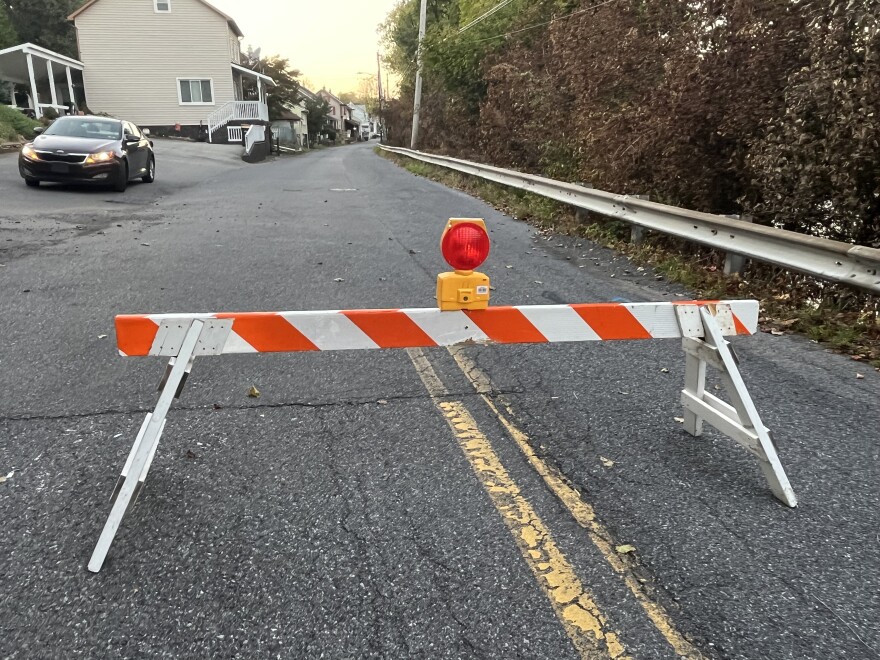WHITEHALL TWP., Pa. — The smiling image displayed on the American flag stands as a sad reminder why Water Street is temporarily closed to through traffic as the township board of commissioners decide how to prevent future tragedies.
The image is that of Edward D. Tomcics, 75, whose life came to a horrifying end when he was struck and killed by a speeding vehicle as he tried to cross the street to his home on Christmas night last year.
At a workshop Monday, Whitehall Township commissioners advanced a motion directing the mayor to formally request a traffic study and another in support of the street’s temporary closure for the purpose of public safety.Whitehall Township commissioners
After many years of fielding complaints from Water Street residents about the number of vehicles that speed through the 17-feet-wide, two-way street with a 25 mph speed limit, the death of Tomcics, a retired Marine Corps sergeant, was the final straw.
Last month, Whitehall Mayor Joseph J. Marx, under the authority of the township’s Home Rule Charter, closed Water Street to initiate a safety plan and traffic study to help mitigate the rash of speeding vehicles.
At a workshop Monday, commissioners advanced a motion directing the mayor to formally request a traffic study and another in support of the street’s temporary closure for the purpose of public safety.
'Appropriate measures to protect'
The Water Street issue and others will be discussed further and voted on at the full board of commissioners meeting at 7 p.m. Monday, Oct. 13.
The temporary closure has transformed Water Street into a cul-de-sac at Eberhart Road with a donated railroad crossing gate.
“We’ll make sure we have the right, legal and logical measures — if they can be taken — so residents and people passing through the Water Street corridor have safe passage and there’s no more loss of life.”Whitehall Township Mayor Joseph J. Marx
Detour signs and blinking sawhorses are in place, and police, fire department and emergency services have given their clearance.
Marx has determined the present condition of Water Street creates a substantial safety hazard because, in part, of the volume of traffic and the lack of substantive design improvements.
“As Whitehall mayor, I represent all 30,000 residents, not just Darktown,” Marx said. “I do what I feel is right to protect all citizens.
“We’ll take appropriate measures to protect the township from litigation, to make sure school children have a safe passage to a school bus.
“We’ll make sure we have the right, legal and logical measures — if they can be taken — so residents and people passing through the Water Street corridor have safe passage and there’s no more loss of life.”

'We're not waiting'
Via a petition initiated by Marx, 70% of Water Street residents agree with the temporary street closure.
Commissioners also reviewed a resolution authorizing completion of certain surveying and engineering work on Water Street.
The findings would provide recommendations and planning considerations for potential improvements for pedestrians and vehicles, including a potential traffic calming study.
“We need to get this straightened out as fast and safe as you can.”Whitehall Township Commissioner Philip Ginder
The board plans to contract with Keystone Consulting Engineers and Benchmark Civil Engineering Services Inc. to perform the study, which will take several months, township engineer Frank Clark said.
The cost of the study will not be known until the Oct. 13 meeting, Clark said.
Marx recently learned UGI Corp. plans to perform a cast iron gas pipe replacement on Water Street.
“They’re saying 2027,” Marx said. “But do we put the traffic calming measures in and then UGI comes and tears up the street?”
Said Commissioner Philip Ginder: “We need to get this straightened out as fast and safe as you can.”
Clark said the current temporary road closure affords workers to do the work safely.
“We’re not waiting" until the UGI project is completed, he said.
Replacing cast iron gas pipes in roadways involves excavating trenches to lay new, modern pipes.
Such construction likely will cause temporary traffic impacts, noise and dust, with permanent restoration of the road surface happening after the ground has settled.


